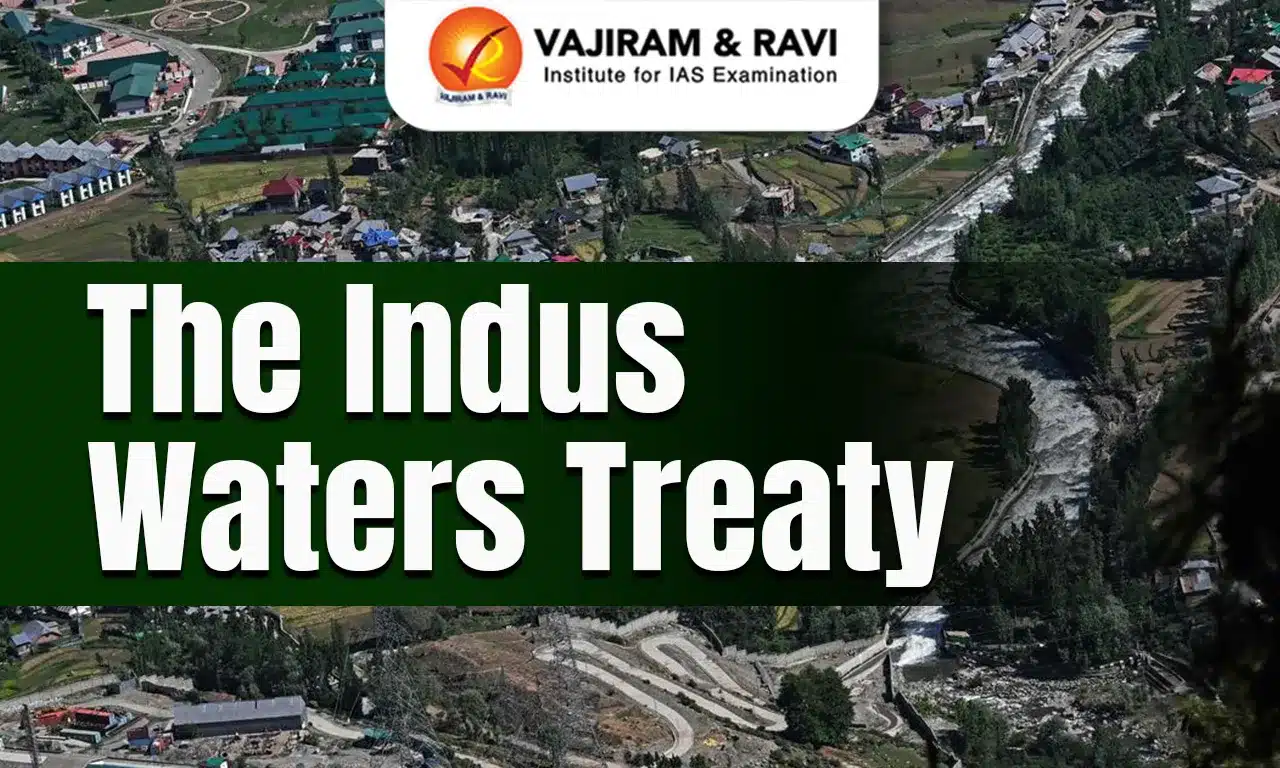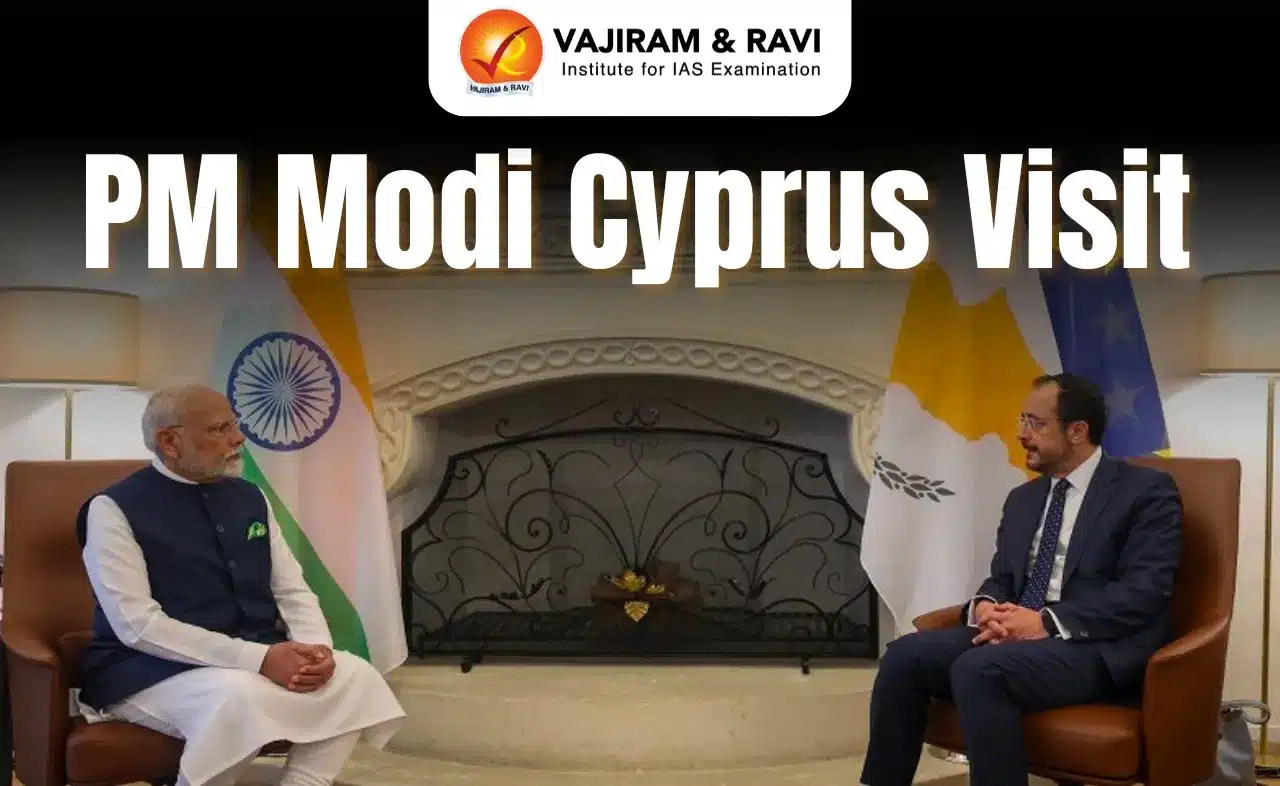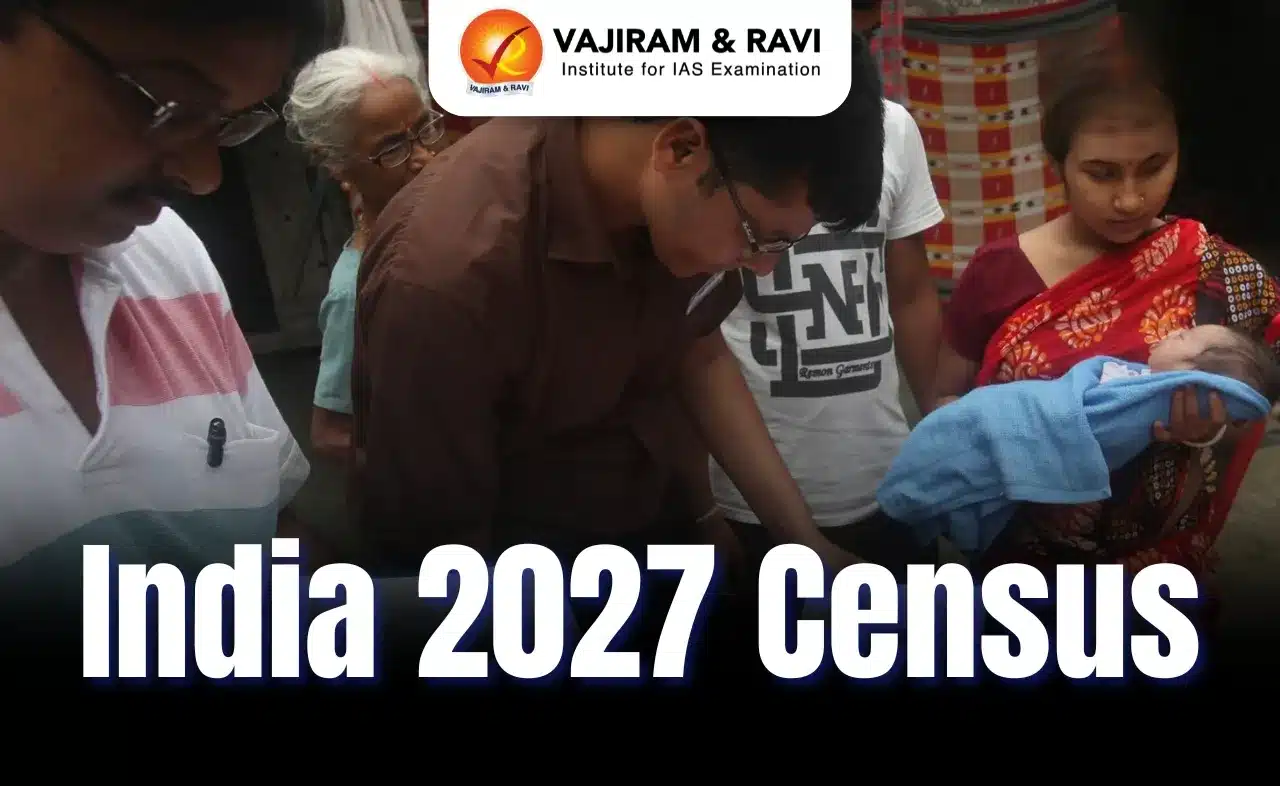The Indus Water Treaty Latest News
- The suspension of the Indus Waters Treaty (IWT) between India and Pakistan in the wake of the Pahalgam terrorist attack has reignited debates on whether shared natural resources like water can be used as tools of geopolitical leverage.
- This raises concerns about legality, sustainability, and international credibility from India’s standpoint.
Background – The Indus Water Treaty
- Partition and river dependency:
- The partition in 1947 left Pakistan (downstream of the Indus basin) heavily reliant on river flows that originated in India.
- In 1948, India’s brief suspension of water flow created a regional crisis.
- Mediation and agreement:
- World Bank-brokered agreement led to the Indus Waters Treaty in 1960.
- The IWT allocated the eastern rivers (the Ravi, Beas, and Sutlej) to India, and the western rivers (the Indus, Jhelum, and Chenab) to Pakistan.
- It allowed India certain non-consumptive uses (of western rivers) such as generating hydropower, provided they meet stringent design and operational conditions.
Resilience of the Treaty
- Durability despite conflicts: Survived three wars (1965, 1971, 1999), diplomatic breakdowns, and cross-border skirmishes.
- Success attributed to its technical nature and institutional mechanisms:
- Permanent Indus Commission.
- Dispute resolution via bilateral consultations, neutral experts, and Court of Arbitration.
India’s Hydropower Projects and Emerging Tensions
- Strategic shift post-terrorism:
- Calls to revise the IWT intensified after the Uri (2016) and Pulwama (2019) attacks.
- India views water as a potential strategic leverage against state-sponsored terrorism from Pakistan.
- Contentious projects: Kishanganga (Jhelum) and Ratle (Chenab) hydroelectric projects became flashpoints – Pakistan alleges violation of treaty; India asserts compliance.
- Legal proceedings:
- Kishanganga: The Court of Arbitration (2013) allowed India’s diversion with ecological safeguards.
- Ratle:
- India chose a neutral expert, Pakistan preferred the Court of Arbitration.
- The World Bank, tasked with administering the treaty’s dispute process, paused both requests to avoid parallel proceedings.
- However, it allowed both to go forward, prompting India to boycott the arbitration proceedings while participating in the neutral expert process.
Legal and Diplomatic Dimensions
- Third-party mediation and Simla agreement:
- India cites Simla agreement (1972) for bilateralism.
- However, IWT predates Simla and allows third-party adjudication by consent.
- International precedents:
- Danube River disputes (Hungary-Czechoslovakia, Hungary-Slovakia) resolved through ICJ rulings and cooperation.
- The Mekong River Commission in Southeast Asia helps manage hydropower-related tensions.
Risks of Unilateral Withdrawal
- International repercussions: Unilateral exit would –
- Undermine India’s image as a responsible power.
- Trigger World Bank intervention.
- Alarm neighbours like Nepal and Bangladesh.
- Legal constraints:
- IWT is a binding treaty; no withdrawal clause.
- The Vienna Convention permits withdrawal only under exceptional conditions.
- Ethical considerations:
- Water as a human right, not a weapon.
- Retaliatory cuts may lead to humanitarian crises in Pakistan’s downstream communities.
Way Forward
- Leverage within the legal framework: India should –
- Maximise its permitted usage under IWT.
- Continue legitimate hydropower projects within treaty parameters.
- Preserving the spirit of cooperation:
- IWT is a rare model of cooperation between adversaries.
- Withdrawing could undo diplomatic gains, and set dangerous precedents for resource conflicts globally.
Conclusion
- While strategic considerations are valid in geopolitics, the Indus Waters Treaty underscores the principle that shared resources demand shared responsibility.
- In a volatile region, India’s strength lies in demonstrating moral and legal leadership – choosing cooperation over coercion.
The Indus Water Treaty FAQs
Q1. What are the key provisions of the Indus Waters Treaty (1960), and why is it considered a successful water-sharing agreement?
Ans. The Indus Waters Treaty allocates the eastern rivers to India and western rivers to Pakistan while allowing limited non-consumptive use by India, and is considered successful due to its resilience during wars and political tensions.
Q2. Why has India’s hydroelectric development in Jammu and Kashmir become a point of contention under the Indus Waters Treaty?
Ans. India’s projects like Kishanganga and Ratle are seen by Pakistan as giving India undue control over water flow, leading to legal disputes over treaty compliance.
Q3. Discuss the dispute resolution mechanism under the Indus Waters Treaty.
Ans. The treaty provides a three-tier mechanism including bilateral talks, neutral experts, and arbitration by a Court of Arbitration, all of which have been activated in past disputes.
Q4. What are the implications of a unilateral withdrawal by India from the Indus Waters Treaty?
Ans. Unilateral withdrawal could damage India’s international reputation, invite legal challenges, and strain relations with neighbouring countries dependent on transboundary rivers.
Q5. How does the Indus Waters Treaty illustrate the role of international legal frameworks in managing shared natural resources?
Ans. The IWT exemplifies how legal agreements, supported by neutral institutions like the World Bank, can sustain cooperation even between adversarial states over vital resources like water.
Source: TH
Last updated on June, 2025
→ UPSC Notification 2025 was released on 22nd January 2025.
→ UPSC Prelims Result 2025 is out now for the CSE held on 25 May 2025.
→ UPSC Prelims Question Paper 2025 and Unofficial Prelims Answer Key 2025 are available now.
→ UPSC Calendar 2026 is released on 15th May, 2025.
→ The UPSC Vacancy 2025 were released 1129, out of which 979 were for UPSC CSE and remaining 150 are for UPSC IFoS.
→ UPSC Mains 2025 will be conducted on 22nd August 2025.
→ UPSC Prelims 2026 will be conducted on 24th May, 2026 & UPSC Mains 2026 will be conducted on 21st August 2026.
→ The UPSC Selection Process is of 3 stages-Prelims, Mains and Interview.
→ UPSC Result 2024 is released with latest UPSC Marksheet 2024. Check Now!
→ UPSC Toppers List 2024 is released now. Shakti Dubey is UPSC AIR 1 2024 Topper.
→ Also check Best IAS Coaching in Delhi
Tags: indus water treaty mains articles upsc current affairs upsc mains current affairs
























